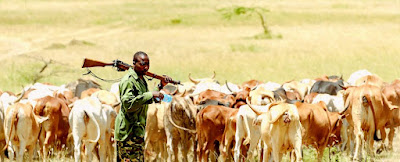By Ben Adler
A herder guarding his cattle. (click here)
Violent confrontations (click here) over increasingly scarce water in Africa have broken out in northern Cameroon, causing more than 30,000 people to flee into neighboring Chad, according to the U.N. Refugee Agency. Since Sunday, 22 people have been killed and 30 others seriously injured in fighting between fishermen and farmers, which follows an eruption of violence in August, which led to 45 deaths and forced 23,000 Cameroonians to leave their homes.
The root cause, according to the United Nations, is the dramatic decrease of water levels in Lake Chad, which has lost 90 percent of its surface area since 1963 due to overuse and climate change. “The water body is no longer sufficient to meet the demands of the population who need water to carry out their daily activities,” Benjamin Tonga, a campaigns officer at CIVICUS, a global alliance of civil society organizations based in South Africa, told Yahoo News. The dwindling of water resources has led to fighting over what is left.
“The conflict started in August between herders and fishermen, and it’s all about the sharing of resources and especially of water,” Xavier Bourgois, a spokesperson for the U.N. High Commissioner for Refugees (UNHCR) in Cameroon, told Yahoo News. “What they do in that specific region of Cameroon is fishermen dig holes to do fish farming. As there is a lack of water in this region, the cows are naturally attracted by the water, by these huge holes made by the fishermen. That was the beginning of the conflict.”
The herders raise cattle, and when their livestock are drawn to the muddy, water-filled ditches, they can fall in and drown. So angry herders have attacked farmers to punish them for digging the trenches and to prevent them from making new ones, which in turn leads to reprisals. The fighting that broke out as a result led to the displacement of tens of thousands Cameroonians....
Violent confrontations (click here) over increasingly scarce water in Africa have broken out in northern Cameroon, causing more than 30,000 people to flee into neighboring Chad, according to the U.N. Refugee Agency. Since Sunday, 22 people have been killed and 30 others seriously injured in fighting between fishermen and farmers, which follows an eruption of violence in August, which led to 45 deaths and forced 23,000 Cameroonians to leave their homes.
The root cause, according to the United Nations, is the dramatic decrease of water levels in Lake Chad, which has lost 90 percent of its surface area since 1963 due to overuse and climate change. “The water body is no longer sufficient to meet the demands of the population who need water to carry out their daily activities,” Benjamin Tonga, a campaigns officer at CIVICUS, a global alliance of civil society organizations based in South Africa, told Yahoo News. The dwindling of water resources has led to fighting over what is left.
“The conflict started in August between herders and fishermen, and it’s all about the sharing of resources and especially of water,” Xavier Bourgois, a spokesperson for the U.N. High Commissioner for Refugees (UNHCR) in Cameroon, told Yahoo News. “What they do in that specific region of Cameroon is fishermen dig holes to do fish farming. As there is a lack of water in this region, the cows are naturally attracted by the water, by these huge holes made by the fishermen. That was the beginning of the conflict.”
The herders raise cattle, and when their livestock are drawn to the muddy, water-filled ditches, they can fall in and drown. So angry herders have attacked farmers to punish them for digging the trenches and to prevent them from making new ones, which in turn leads to reprisals. The fighting that broke out as a result led to the displacement of tens of thousands Cameroonians....
